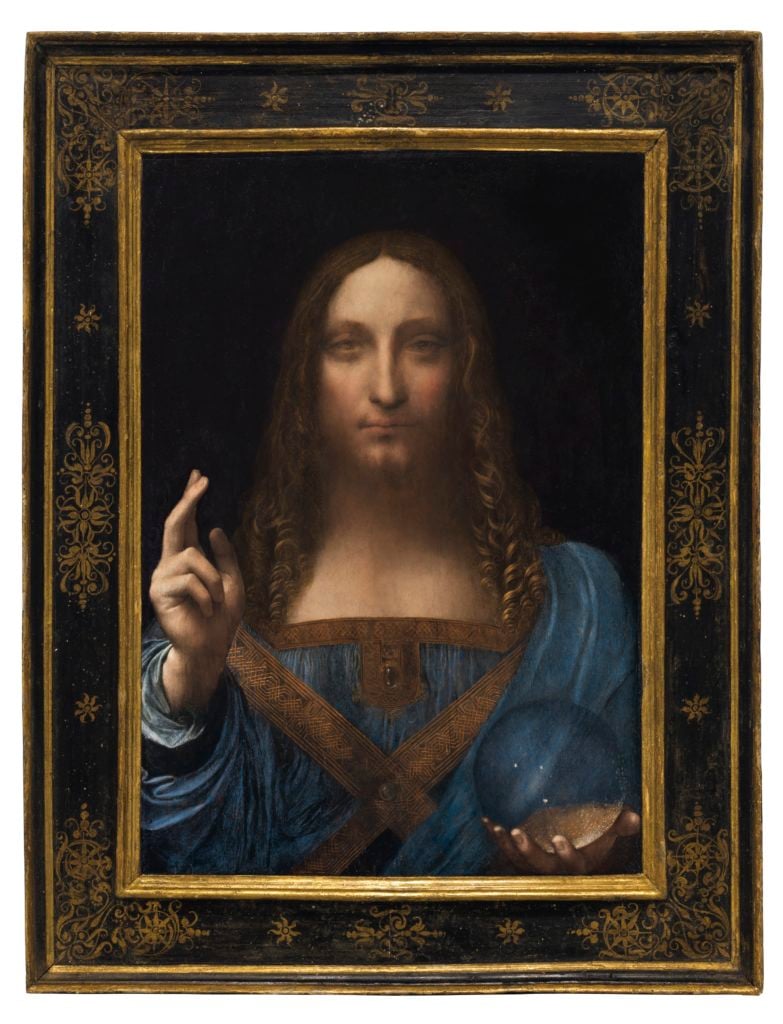|MercatorNet |November 22, 2017|MercatorNet |


Seeking salvation after the plebiscite
Is 2017 a turning point in world history?

The day after the Yes vote triumphed in Australia’s same-sex marriage plebiscite last week, Salvator Mundi, the last of Leonardo da Vinci's paintings, was sold in New York at Christie’s for US$450,312,500. This is the highest price ever paid for a painting.
Once owned by Charles I, of England, it was sold in 1958 at Sotheby’s for £45. As late as 2005, it sold for just US$10,000, heavily over-painted and badly damaged. In 2011, however, after restoration, it was listed amongst Leonardo’s works in an authoritative catalogue published by London’s National Gallery -- and its value skyrocketed. Still, there are art critics who doubt whether da Vinci painted it or whether it was created by his workshop or by an admirer of his style.
What is it about this Renaissance painting which made an anonymous bidder pay the GDP of Tonga for it, even though a dark cloud of inauthenticity hovers overhead?
 A number of observers have ventured some guesses. First, the artist. Leonardo da Vinci has become the quintessential genius – not only an artist, but an inventor, scientist, engineer, and anatomist. Second, the mysterious, ethereal quality of his paintings. The enigmatic expression of the figure, like that of the Mona Lisa, draws us into another world. Third, the Leonardo da Vinci brand. Like Paris Hilton, Leonardo is famous nowadays because he is famous. Dan Brown’s pot-boiler The Da Vinci Code owes its success, in part, to a masterful exploitation of the brand.
A number of observers have ventured some guesses. First, the artist. Leonardo da Vinci has become the quintessential genius – not only an artist, but an inventor, scientist, engineer, and anatomist. Second, the mysterious, ethereal quality of his paintings. The enigmatic expression of the figure, like that of the Mona Lisa, draws us into another world. Third, the Leonardo da Vinci brand. Like Paris Hilton, Leonardo is famous nowadays because he is famous. Dan Brown’s pot-boiler The Da Vinci Code owes its success, in part, to a masterful exploitation of the brand.
But whether it is by Da Vinci or not, hardly anyone has examined the mysterious attraction of the painting itself.
The 45.4 cm × 65.6 cm oil painting is an image of Jesus Christ which blends Renaissance humanism with the Byzantine icon tradition. His right hand is raised in blessing but also testifying to the Trinity, three persons in one God, and to the union of human and divine in Christ. His left hand grasps a glass orb symbolising universal kingship.
The expression of the face, however, does not underscore his authority and power. Instead, it conveys warmth, gentleness and understanding. This is the Saviour of the World, the Redeemer, the Christian God who invites all men to join him in everlasting bliss in heaven. The painting is an artistic rendering of the core of the Christian message.
The year 2017 is an odd time for the art world to pay tribute to the promise of Christianity. Perhaps the fascination with this mysterious portrait is a sign that the world is still looking for salvation, for a way to overcome the limitations of the human condition and to satisfy our longing for transcendence.
In part, the Yes vote won in Australia’s same-sex marriage plebiscite because a good part of the country has divorced itself from Christianity. As an example, a journalist in Western Australia had scathing words for a Christian MP who will abstain from voting for a bill when it comes before Parliament. “Thank you for letting your imaginary friend and a book of fables written 2000 years ago dictate your actions instead of the people you were voted in to represent.” This is not an uncommon sentiment in some circles.
Yet gays and lesbians and same-sex marriage supporters are looking for the Salvator Mundi, too, in their own way. For them, salvation comes in the form of the satisfaction of sexual desire. As an example of their high-minded ideals of a future paradise, take this excerpt from a speech by Roz Ward, the co-founder of the Safe Schools programme. She wants to “create a world where human sexuality, gender and how we relate to our bodies can blossom in extraordinarily new and amazing ways that we can only try to imagine today.”
Ms Ward is as close as anyone is to being a theorist of a culture which has embraced same-sex marriage. She happens to be a Marxist and believes that Marxism is the key to sexual bliss. But her notion of salvation through sex is widely shared.
So what are the implications of swapping salvation through faith for salvation through sex? The old salvation had answers to the deepest questions of human existence which the new salvation ignores completely.
Two of the key questions are “why do I have to suffer?” and "why must I die?" Christianity had an answer for that in the Crucifixion. Salvation through sex has none – there is mental torment which sex cannot cure. Perhaps the ersatz answer will be euthanasia.
Or what about the vexed question of equality? Christianity views all men and women as equal because they are all sons and daughters of God. The Roz Ward model implies a hierarchy based on their sexual desirability.
Or what about what happens after death? Christianity greets death joyfully, because, however wrenching, it releases us to join the Salvator Mundi who lives beyond the veil of earthly life. Salvation through sex fears death.
Or what is truth? For Christianity, whose founder said “I am the Way, the Truth and the Life”, finding the truth is central to its appeal. But it reasons metaphysically, asking questions which cannot be answered with numbers and statistics alone. For the salvation-through-sex model, statistics, what can be counted, is the high road to certainty. But this means most of life’s big questions are frustratingly unanswerable.
Or “am I my brother’s keeper?” Christianity is essentially social. As the Apostle John wrote, “he that loveth not his brother whom he hath seen, how can he love God whom he hath not seen?” This is amongst the reasons why Christianity seeks to idealises the family unit. Protecting the vulnerable and oppressed is in Christianity’s DNA. But the LGBTQI+ crowd are narrowly focused on the satisfaction of their own individual desires.

Francis Bacon: Three Studies for a Portrait of Henrietta Moraes, 1963
Or where is beauty to be found? There is no definitive model of Christian aesthetics, but Christian cultures of the past taught that great art is, in some mysterious way, a reflection of transcendence, of God himself. Salvation-through-sex implies that we can touch that transcendence only in the passion of sexual union. It’s the difference between Leonardo Da Vinci’s Salvator Mundi and the grotesque, tormented works of the gay English artist Francis Bacon. Perhaps this is why the paintings of so many gay artists are scatological and obscene.
Perhaps 2017, the year when the Anglosphere finally embraced same-sex marriage, is an inflection point in history, at least in the history of these countries. It is the moment when the object of their hope changed from transcendence, something greater than man, to materialism, something less than man.
History only makes sense long after it’s over. We’ll have to wait a hundred years to see how well humanity fares under the New Dispensation. My guess is that it will crumble under the weight of its unanswered questions, and that people will return to the mild but penetrating gaze of Salvator Mundi.
Michael Cook is editor of MercatorNet.

November 22, 2017
For Australians, last week brought the curious juxtaposition of the country’s capitulation to the same-sex marriage crusade, and the public re-appearance of a long-lost and then long-obscured picture of Christ as Salvator Mundi, by (very probably) Leonardo da Vinci.
Reflecting on this coincidence in an article today, Michael Cook says that same-sex marriage seems to be about salvation through sex, but that kind of salvation cannot answer the deepest questions of human existence. Only the old salvation has those answers, he suggests, with examples that are well worth pondering.
That is also, ultimately, the message of German cultural critic Gabriele Kuby, interviewed in Melbourne by Family Edge contributor Veronika McLindon. The Catholic convert and writer argues that the courage to resist the tide of gender ideology will come from strong, loving families, who draw strength from their Christian faith.
That seems pretty clear to me. Much as one would wish that all thinking people, religious or not, could see the irrationality and futility of same-sexuality, it becomes clearer by the day that only religious people – and by no means all of them! – actually can.
Reflecting on this coincidence in an article today, Michael Cook says that same-sex marriage seems to be about salvation through sex, but that kind of salvation cannot answer the deepest questions of human existence. Only the old salvation has those answers, he suggests, with examples that are well worth pondering.
That is also, ultimately, the message of German cultural critic Gabriele Kuby, interviewed in Melbourne by Family Edge contributor Veronika McLindon. The Catholic convert and writer argues that the courage to resist the tide of gender ideology will come from strong, loving families, who draw strength from their Christian faith.
That seems pretty clear to me. Much as one would wish that all thinking people, religious or not, could see the irrationality and futility of same-sexuality, it becomes clearer by the day that only religious people – and by no means all of them! – actually can.
 Carolyn Moynihan
Carolyn MoynihanDeputy Editor,
MERCATORNET
If you just donate once a year, think of us
By Michael Cook
Give MercatorNet a hand!
Read the full article
Read the full article
Zimbabwe beware: the military is looking after its own interests, not democracy
By Enock C. Mudzamiri
Can a genuine democratic transition take place?
Read the full article
Read the full article
The great divide in ethics over the mystery of human life
By Margaret Somerville
Is there something special about humanity?
Read the full article
Read the full article
Strong families can resist the new sexual revolution
By Veronika Winkels
But they will also need strong faith and convictions, says Gabriele Kuby
Read the full article
Read the full article
British Royals celebrate 70 years of marriage
By Ann Farmer
Late marriage and divorce rates make such achievements rarer.
Read the full article
Read the full article
Seeking salvation after the plebiscite
By Michael Cook
Is 2017 a turning point in world history?
Read the full article
Read the full article
Do you have a right to repair?
By Karl D. Stephan
Who really owns your iPhone?
Read the full article
Read the full article
Stranger Things: a dystopia with friendship and hope
By Michael Kirke
Real darkness threatens but goodhearted people have their own power.
Read the full article
Read the full article
African population growth - say not an “explosion” but an “opportunity”
By Marcus Roberts
And this is from the UN even!
Read the full article
Read the full article
MERCATORNET | New Media Foundation
Suite 12A, Level 2, 5 George Street | North Strathfield NSW 2137 | AU | +61 2 8005 8605















































No hay comentarios:
Publicar un comentario